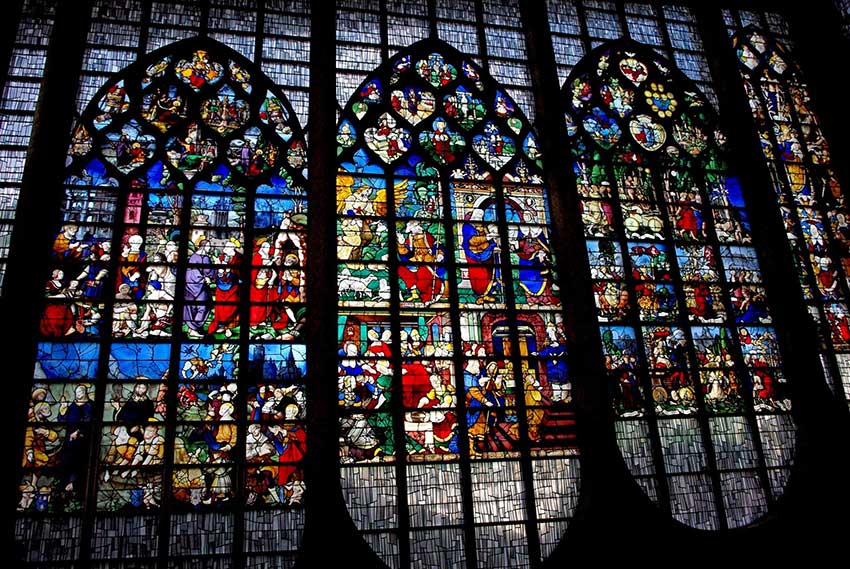
What do you do when something doesn’t turn out the way you had hoped?
I can never read the life story of St Joan of Arc without experiencing a terrible emotional crisis towards the end. Joan’s fate in prison was not yet determined, and there was a chance she would be freed – but then she discovered she was going to be sold to the English armies.
Joan then tried to escape or commit suicide (or both) from her prison cell by leaping from the window, a drop of some 60 feet.
Finding God in suffering – easier said than done
She wasn’t injured, but she later realised that she had done the wrong thing by trying to escape. It showed a lack of trust in God’s plan for her, and she confessed her escape attempt to a priest.
I think this is one of the things that shows her sanctity: that she could completely lose heart and yet walk back from that, knowing that God had ordained a different type of suffering for her future.
Joan is behaving in the same way that Jesus did when He’s described as setting His face bravely towards Jerusalem. It’s an acceptance of the awfulness to come, even though you know it will be awful – and terribly unjust.
The collateral damage and victims of abuse
Without wanting to be too obvious, there are many people in the Catholic Church today in similar situations. It’s hard to talk about collateral damage, because there has already been so much damage of so many innocent people – both abuse victims who haven’t been believed, and wrongly accused priests.
When Catholics try to tell me that the sexual abuse crisis is largely manufactured by enemies of the Church, I agree with them – but we differ on who the real enemies are. I usually direct them to a website called bishopaccountability.org which has a mass of horribly convincing data.

Formal inquiries into sexual abuse by clergy on a broad scale use different terminology, depending on how believable and provable the allegations are.
‘Substantiated’ allegations are those which have been investigated and the allegation is found credible or true, based on the evidence gathered.
‘Unsubstantiated’ allegations are those which have been investigated and the allegation was found not credible or false, again based upon the evidence.
There’s another category called ‘Unable to be proven’ where there has been an incomplete investigation because of a lack of information.
Within these categories is a whole spectrum of claims – from those where it’s very likely the priest was guilty of everything he was accused of and more, right down to unjust speculations made by troubled fantasists.
The same Catholics who tell me we are being persecuted rather than justly punished also tend to believe that most abuse allegations are malicious, made up for money, or fabricated by mentally unwell people.
“The same Catholics who tell me we are being persecuted rather than justly punished also tend to believe that most abuse allegations are malicious …”
However, the 2004 US-based John Jay report on the scope of child sexual abuse by clergy found that out of 5,681 diocesan investigations of abuse allegations from 1950-2002, around 80% of all allegations were substantiated.
A further 18% of all allegations were unsubstantiated. Finally, just 83 allegations (1.5%) were found to be false.

The important part is also understanding what the usual response of any diocese has been in the last five decades: to allow the accused priest – if he was still living – to simply retire or resign.
Very few have gone to prison, been removed from the priesthood, or have sought laicization.
In fact, the largest single group of accused priests had already gone to be judged by their Creator when they were accused of historical sexual abuse.
The upshot of this is that we know that many clerical abusers have gotten away with their crimes in this life. They’ve been stood down, protected, allowed to die without trial, with no acknowledgement from their dioceses and religious superiors of what they’ve done.
Their hundreds – possibly thousands – of victims have been left with no validation, no closure, and no justice from a Church that told them they were imagining things.
We can pray for the Joans among us
So perhaps if God requires that a public atonement be made for this – and if someone offers to pay for this and accepts injustice as their cross and an expiation – then I suppose that’s the way it must be.
We can’t all be Joan of Arc, but we can at least pray for those who have accepted this cross and expiation and are living it out on a daily basis.
Dr Philippa Martyr is a Perth-based historian, university lecturer and academic researcher.
